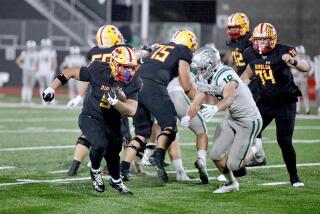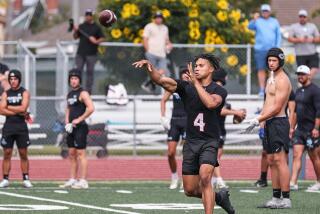Time Runs Out for Football at CSULB : Education: The elimination of Division I football may be just the first of many major cuts due to ongoing budget problems. Some entire academic programs may go, officials hinted.
- Share via
Cal State Long Beach officials said their decision earlier this week to drop football may just be the beginning of major cuts in programs at the financially strapped school.
“The bigger picture is not the elimination of football, but the question of whether or not we’re going to eliminate academic programs next year,” President Curtis L. McCray said. “It’s conceivable that in football we have a kind of metaphor for academic life as we enter the future.”
A $15-million reduction earlier this year in its $155-million budget forced the university to make across the board cuts--eliminating hundreds of faculty positions, dropping many classes and reducing enrollment by about 2,000 students.
But now university officials will be considering the elimination of entire academic programs, a somber McCray said at the Tuesday news conference in which he announced that football was being dropped. He said he expects the school will be forced to absorb a similar budget reduction next year.
“This is the first time we’ve eliminated an entire program,” he said. “We’ve gone about as across the board as we can. I can’t do that anymore.”
McCray would not say, however, which programs are most likely to go. “In general, we will be looking at productivity and student demand,” he said. “This will be a business decision, not decisions of the heart.”
At the news conference, McCray announced that the university was dropping football entirely for 1992, although it may be resumed in 1993 at a lower competitive level that would be less expensive. The 49ers were competing in Division I football, which is played by major universities.
Some university officials and boosters predicted that the decision will hurt fund-raising efforts at the school, which has never raised more than $500,000 for all sports in any one season.
Interim Director of Athletics Dave O’Brien admitted that the demise of football will chase away some financial supporters. “It will probably have an impact on our fund raising,” he said. “But I hope it is minimal.”
Booster Bill Ridgeway said the university can expect to suffer an immediate drop in donations. “When the fund-raising drive starts next year, they better grab what there is, because I bet they don’t raise half of what they got this year.”
Using donations, the university intends to honor the scholarships of 43 players until they graduate. The university will also keep football Coach Willie Brown on the payroll at a cost of between $70,000 and $80,000 for each of the next four years.
O’Brien acknowledged that in the short term, other athletic team budgets may be squeezed by the decision to drop football. But in the long term, he said, he sees benefits. The university intends to complete a new basketball gymnasium at an additional cost of about $6 million, and it will refurbish the baseball field for about $1 million.
“There’s a risk in all of this, but we’re taking it.”
Several members of the Touchdown Club, the primary football fund-raising group, said they will take their money elsewhere.
Said Ridgeway, who raised between $40,000 and $50,000 last year for 49er football: “If you drop football, you can kiss me goodby. I’m through . . . I’m tired of being lied to.” Ridgeway charged that the university skewed figures that it provided to the football review committee in pressing its case to get rid of football. He also said he believed that McCray had created the panel to give the appearance that he wanted input from the community, when, in fact, he intended to do away with football from the beginning.
Boosters said they believe that McCray made up his mind to drop football last spring when a university fact-finding committee recommended that it be eliminated or severely downgraded to cope with the budget crisis.
McCray appointed another committee to examine the future of football. The group recommended on a 14-1 vote that football be retained.
Boosters and some members of the committee said it became obvious to them as the review process dragged on during the team’s 2-9 season that “we were not only misused, we were abused,” according to football review committee member Chuck Meng, who is also a member of the university board of governors.
He explained that the review committee only saw the Touchdown Club report last Monday at its final meeting. But before the plan was put up for discussion, O’Brien announced that it was unacceptable. He accused McCray of paying little more than lip service to members of the panel.
Explained committee member Don Dyer, an attorney: “A lot of the committee members and the Touchdown Club felt very strongly that this decision was made a long time ago.”
Boosters called O’Brien--who was McCray’s surprise choice last September to replace Corey Johnson when Johnson took an athletics director job at Colorado State--a “hatchet man.”
The Touchdown Club proposed the creation of an endowment fund that would raise as much as $850,000 a year in cash and gifts. But the school’s main fund-raiser, Jerry Mandell, said the proposal just wasn’t believable.
“My analysis is that it just won’t meet the dollar figure targeted,” he said.
McCray, who met with key boosters last Friday in his campus office, denied that he had decided a long time ago to drop football. He said he had put off a decision because “I kept hoping the boosters had an angel out there who could put cash on the barrel.”
Student body President Diane Sanchez credited McCray for making a tough decision: “In this situation, the president did the right thing. It’s nothing that I want to see, but his back was up against the wall.”
Since it’s heyday in 1970 when it won the old Pacific Coast Athletic Assn. title with a dramatic 27-11 victory over archrival San Diego State, the 49er football program has struggled for both dollars and recognition. The team has had only four winning seasons since 1981.
In November, 1986, then-President Stephen Horn gave boosters a month to raise $300,000 or see football eliminated. Boosters came up with $15,000 more than that and Horn relented. A year later, Horn was forced to resign in the wake of disclosures of a major deficit in the university budget.
Since 1986, to keep the dollars rolling in, the 49ers became patsies for football powerhouses such as Clemson, Miami and UCLA. The school had three football coaches in that span, including the late George Allen, who, after calling his position the ‘toughest job in America,” rallied the 49ers to brief success with a 6-5 record in 1990.
In a single year, Allen refitted the weight room, built a new practice field and generated more publicity for the team than it had ever received. At the time of his death, Allen had even bigger plans for the 49ers. Among other things, he wanted to build a stadium on the lower campus near Atherton Avenue.
In short, Allen was hailed as a miracle worker, and his name came up often Tuesday. Boosters, administrators and players agree on one thing: When Allen died on Dec. 31, 1990, so, in effect, did 49er football.
More to Read
Get our high school sports newsletter
Prep Rally is devoted to the SoCal high school sports experience, bringing you scores, stories and a behind-the-scenes look at what makes prep sports so popular.
You may occasionally receive promotional content from the Los Angeles Times.






